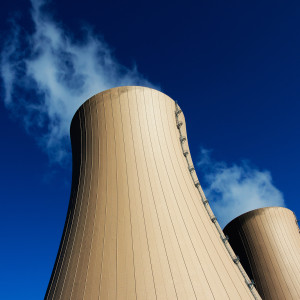Sixty years ago, nuclear power was the energy of the future, promising a nearly limitless supply of clean, cheaper power. That future has yet to arrive. In fact, today, utilities are increasingly transitioning out of nuclear generation, shuttering aging reactors and shelving plans to reinvest in new technology. This is more than just a shift from one fuel to another, says David Gattie, an associate professor of environmental engineering at the University of Georgia. The decline in interest in nuclear energy has significant impacts on America’s national security.
“Nuclear energy is a unique resource because of its unmatched energy density and dual-purpose utility for electric power generation and nuclear weaponry,” Gattie writes in a recently published paper. “Triple-purpose if applications in medicine are included. However, the U.S. made critical policy decisions in the past that have carried forward and compromised America’s capacity to advance in the civilian nuclear power space.”
Although American scientists began the atomic age, more recently, research and development in nuclear technology, including civilian nuclear, has decreased to a level that threatens American primacy and, by extension, national security.
“What is happening as the U.S. has somewhat retreated and while we have lapsed to a time where we have not advanced in the nuclear science and engineering sector, Russia, China and other country are advancing pretty aggressively in that regard and in fact they’re leveraging nuclear power [for foreign policy influence,]” Gattie told InsideSources.
These sorts of initiatives will have a long term impact on American foreign policy and long term national security, since they develop longstanding ties between Russia, China, and other developing countries in the region. Meanwhile, they are also helping to continue to widen the gap between American technology and that developed overseas.
“While the U.S. currently leads the world in the number of operable nuclear reactors, and has since the beginning of the civilian nuclear power age,” writes Gattie, “China, Russia and India, each, are outpacing the U.S. in the total number of nuclear plants under construction, planned or proposed.”
China has more than 230 reactors under construction, planned, or proposed and Russia has 55. The two countries are further involved in planned or proposed reactor projects in Jordan, Kazakhstan, Bangladesh, and Vietnam. The continuation of this trend threatens America’s role as global steward of nuclear technology and fuel, a position the country has held since the end of the Second World War. The national security impacts of such a shift would influence the country’s future for decades to come.
“In the event that America’s influence over the fuel cycle diminishes, so too can its stewardship responsibility—a role that would eventually be assumed by another country,” Gattie concludes.
As he sees it, the present situation is the result of the immediate and acute market pressure of cheap natural gas and longer term political changes that began to halt nuclear research and development in the 1990s. After over two decades of political apathy, the U.S. is running the risk of falling behind the rest of the world in terms of nuclear technology, rather than maintaining its position of global leader.
To combat this trend, Gattie advocates specific legislative action to provide fixed support for nuclear research and development. For the purposes of longevity, this would optimally be a legislative, rather than executive action. This space to resurrect research in technologies like molten salt and breeder reactors would signal that the U.S. is committed to the future of nuclear energy.
One of the challenges facing nuclear energy today is competing policy goals from states and the federal government. When Exelon announced last year that it was planning to close the Three Mile Island reactor in Pennsylvania, state laws offering subsidies to certain types of clean energy were one of the few possibilities for keeping the doors open. Although the nation may have an interest in nuclear technology, this is harder to defend on a state level.
At the federal level, there seems to be support for increased nuclear investment. Earlier this month, the Senate passed a bipartisan bill to direct the Department of Energy to prioritize partnering with private entities to test and demonstrate advanced reactor concepts.
“I am proud to join in supporting this important legislation, which will help usher in the next generation of nuclear technology. Nuclear power plays an important role in powering our nation, and it will for years to come. This legislation will ensure that our nation is prepared for an exciting future,” said Senator Sheldon Whitehouse, D-R.I., at the time.

